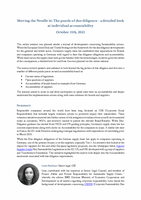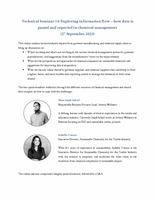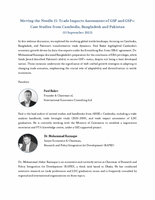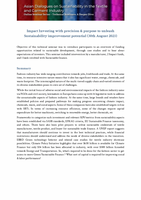Contributions Overview
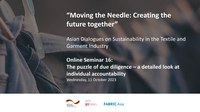
Moving the Needle 16: The puzzle of due diligence – a detailed look at individual accountability
This online seminar was planned amidst a myriad of developments concerning Sustainability actions. While the European Green Deal and Textile Strategy set the framework for the due diligence developments for the garment and textile sector, Germany’s supply chain law established clear expectations for Brands and companies operating in Germany with regard to their due diligence obligations and accountability. While many across the supply chain have grown familiar with the terminologies, however given the extent of the consequences, a detailed look for and from Asia was planned via this online seminar. Invited speakers elaborated on Accountability in the context of current and upcoming laws.

Higg FEM 4.0 Changes: An opportunity for manufacturers to showcase their ambitions in sustainability
Textile supply chains are currently under close scrutiny due to their environmental impact. Are suppliers making progress in line with expectations from brands and retailers and the emerging local laws?

Moving the Needle 16: The puzzle of due diligence – a detailed look at individual accountability
The European Green Deal and the Textile Strategy set the framework for the due diligence developments for the garment and textile sector. Since the beginning of this development, many have grown familiar with the term, however, given the extent of the potential consequences, a detailed look from Asia is needed.
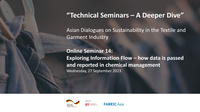
During this seminar, we invited panelists with decades of experience in garment manufacturing and chemical supply chain to engage in discussions about the current chemical management system for garment manufacturers, its successes and shortcomings, and the valuable input from manufacturers on how it can be enhanced. Furthermore, the seminar explored the perspectives and strategies of chemical companies for enhancing data transparency and identified common values held by both garment and chemical suppliers that can contribute to a more streamlined, efficient, and traceable data flow for managing chemicals within the supply chain. In the following you can find the recording of the seminar along with the knowledge product.
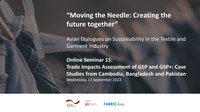
In this online seminar, we delved into the changing trade dynamics of three Asian nations: Cambodia, Bangladesh, and Pakistan. Cambodia, once a Least Developed Country (LDC), met graduation criteria in 2021 and is poised to potentially graduate in 2027, impacting its preferential trade agreement, the Everything But Arms (EBA). Bangladesh, another LDC, has heavily utilized the EBA for duty-free exports to the EU, particularly in the booming garment industry, and is preparing for graduation by 2026. Meanwhile, Pakistan, although not an LDC, has successfully leveraged the GSP+ status with the EU, offering valuable lessons in trade preferences and compliance. In the following you can find the recording of the seminar along with the knowledge product.

Exploring Information Flow – how data is passed and reported in chemical management
Pragmatically, chemical management is about having an effective reporting system to collect, record, and report authentic data along the flow of materials. This session brings together a chemical supplier and a vertically integrated garment supplier to share their insights on chemical data management.
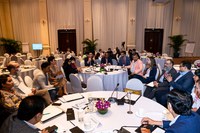
The world of textiles is undergoing a shift as Cambodia, Bangladesh, and Pakistan, which were once least developed, experience changes in their trade patterns. Cambodia's growth was boosted by duty-free exports under the Everything But Arms (EBA) agreement. However, due to concerns about human rights, EBA was partially withdrawn, prompting Cambodia to explore new options. Meanwhile, Bangladesh is preparing for the end of EBA & despite never being an LDC, Pakistan gained GSP+ status. These cases highlight the importance of effective strategies for growth.
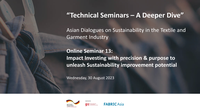
Fashion industry has wide ranging contribution towards jobs, livelihoods and trade. At the same time, its resource intensive nature means that it also has significant water, energy, chemicals, and waste footprint. Lawmakers in Europe have responded with 16 legislative tools to address the unsustainable aspects of fashion industry and many brands have established policies and targets for improving social & environmental performance. Some of the changes require capital expenditure for better machinery, switching to renewable energy, better chemicals, etc. During this technical seminar, participants were introduced to an overview of funding opportunities related to sustainable development for textile industry. Participants also heared from Impact Investment related funds about their experience, plans and objectives using case studies. In the following you can find the recording of the seminar along with the knowledge product.




